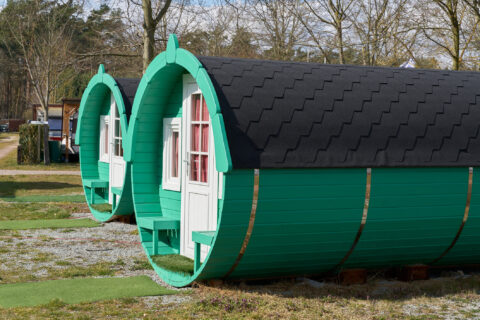How to Maintain Healthy Insurance Premiums for Short-Term Rentals

Operating expenses are just part of the deal when it comes to managing your short-term rental effectively and efficiently. Maintenance takes its chunk, property taxes shave off some more, the homeowner’s association gets a slice, and you may have to pay property management fees to boot.
There’s also your short-term rental insurance premium to think about.
The average cost of short-term rental insurance is $2,000–$3,000, but it can climb as high as $9,000 in vacation destinations like California and Florida. Even though the cost can be as much as 10%–70% higher than your homeowner’s policy, the risks of going without it are just too many.
Fortunately, there are ways you can keep the cost of your short-term rental insurance premiums as low as possible. To help kick-start your brainstorming process, here are 10 ways to keep your insurance premiums at a healthy price point for your short-term rentals.
1. Assess Your Risks
If you’re still looking for your first short-term rental property, this tip will mean something different than if you already own a rental property.
First thing’s first: while shopping for your short-term rental property, consider buying in a low-risk market to help keep your insurance premium down. An area with favorable insurance conditions — stable property values and a low crime rate — can help keep your short-term rental insurance reasonable.
If you already have a property and insurance, conduct a thorough risk assessment of your property to identify potential hazards or liabilities. Consider everything inside and outside the home and across the entire property.
Is there a dead tree on the property that might fall on a renter or their vehicle? Are the beautiful hardwood floors that were so attractive to you a little too slippery? What about the bathroom, the railing on the stairs, the pipes to the kitchen sink?
Nothing should be off-limits during your inspection. If you find something wrong, address any safety concerns proactively to mitigate risks.
2. Check Your Insurance Coverage
Insurance for short-term rentals is unavoidable, and so is the cost that comes with it. That said, one way to manage that cost is to ensure your property has adequate insurance coverage tailored for short-term rentals. This may include liability coverage, property damage coverage, and coverage for loss of rental income.
You’ll also want to consider the factors that impact how much you pay for short-term rental insurance. This includes your policy limits, deductibles, exclusions, and customizations, such as riders or endorsements for the unique aspects of your property.
While you want your premium to be as low as it can be, it’s crucial to make sure you have the right coverage to avoid losing even more money down the road.
3. Ensure Compliance With Regulations
It may not be obvious when thinking about insurance for short-term rentals, but various regulations at the state and local level could lead to a claim being filed against your property, resulting in possible increases in your premium.
Stay up-to-date with state and local laws and regulations, including zoning laws on short-term rentals. Specifically, you should look at building, health, and safety codes to ensure that your short-term rental property complies. Confirming that everything is in proper order can help reduce the likelihood of insurance claims.
4. Take Safety Measures
As the owner of a short-term rental, you’re responsible for making your guests as safe and comfortable as possible. Outfitting your short-term rental home with emergency detection devices and preparedness kits can go a long way toward making your guests feel secure. As a bonus, it can lower your insurance premiums.
Take the time to install or replace smoke detectors, fire extinguishers, carbon monoxide detectors, and first aid kits. Regularly inspect and maintain these safety devices to ensure they are working properly.
5. Enhance Your Property’s Security
How secure is the home you live in? That’s exactly how secure you should make your short-term rental, too. If you haven’t done so already, step up your security measures to protect against theft, vandalism, and other security risks. This may include installing secure locks, security cameras, and alarm systems.
A security system with cameras also can help you keep an eye on your property when it’s not occupied and you’re away.
6. Keep Good Records
Nobody likes taking notes or filing documents, even if it is done on a computer these days. But keeping good records on every aspect of your short-term rental can save you money and heartache in the long run.
Keep thorough documentation of all maintenance records, inspections, and guest communications. This documentation could be valuable later if someone files an insurance claim or a dispute arises.
7. Screen Your Guests
Perhaps the best way to prevent something bad from happening on your property is to screen your guests thoroughly. Implementing a thorough guest screening process can vet potential guests and minimize the risk of problematic behavior or incidents.
The convenient guest screening tool from Safely provides a photo and risk score for potential guests, making it easier to decide whether to confirm their bookings.
By reducing the potential for damage, you can minimize claims and make your insurance premium more reasonable.
8. Create, Post, and Communicate Clear Policies and Procedures
Establish clear policies and procedures for guests regarding check-in and check-out procedures, house rules, and emergency protocols. Communicate these policies to guests clearly and often, and post the rules everywhere you advertise your property, as well as inside the property itself.
9. Train and Educate Your Staff and Property Manager
Train and educate your staff and the property managers responsible for overseeing your short-term rental property. Ensure they are aware of safety protocols, emergency procedures, and insurance requirements.
Also, make sure they know the same policies and procedures you hand down to your guests. Your property manager is your representative for the property, and your staff are your eyes and ears as they go about their duties. Getting everyone on the same page can help you keep your property in top condition at all times.
10. Inspect Your Property Regularly
Conduct regular inspections of the property to identify and address any maintenance issues or safety concerns promptly. Between inspections, talk to your staff or property manager. They may see your rental more than you and will be able to alert you to issues you haven’t seen or didn’t notice.
Applying these 10 simple tips can help you reduce the risk of insurance claims and maintain healthy insurance premiums for your short-term rental properties. Keep your insurance premiums in check by taking advantage of the Safely Protection Plan, which includes guest screening and short-term rental insurance. Contact the Safely team today to learn more.






